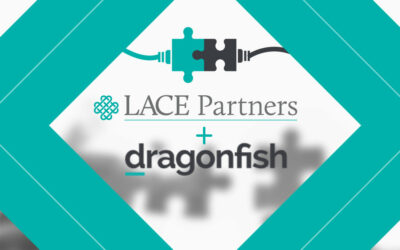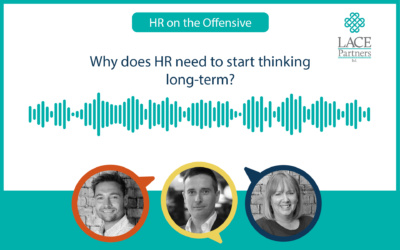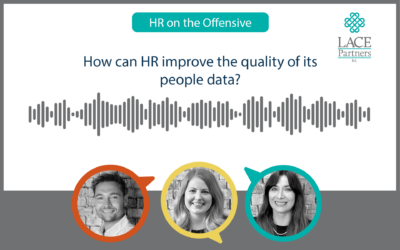In a recent HR on the Offensive podcast Emma Leonis and Chris Howard spoke to Lisa Dennis from SPX Flow about the key lessons her team learned in 2020, as well as discussing the debate over HR demonstrating the value to the rest of the business – has the debate truly subsided now after 2021? In addition, they discuss whether employees will become more empowered as a result of the shift in working patterns caused by the global pandemic.
Reflecting on 2020, what were the key lessons that your team learned and challenges you’ve overcome?
The last 18 months at SPX Flow has seen a lot of transformational change within the business, even before the global pandemic, as a large part of our business was sold. When you add to that the nature of the business – we are a global organisation with over 6,000 employees – having to deal with a global pandemic on top of a recent organisational change as we had, one of the most rewarding elements from my perspective was how we were able to so quickly adapt in the face of such change. As a business model 60% of our business sits within the shared services model and so even as we tackle the challenges and demands of the global pandemic, we are still evolving our business to migrate to a shared services approach. It is exciting times for us as we have a great technology roadmap and we are looking forward to what 2021 will bring.
A success story for us was mobilising our workforce to remote working. We are in an industry – manufacturing – that perhaps didn’t traditionally embrace remote working (in terms of our white-collar workforce). The logistics of a mass migration to remote working was daunting but we managed to deliver that to sites like our Manchester site (200+ employees in one office) within a week. It took a monumental effort from many parties and teams working together but we showed that we could do it and we are really proud of the outcome as a great achievement.
The key lesson I would say we have learned as a business is embracing that shift and we have canvassed opinion of our people about the return to normality (hopefully!) in 2021 regarding how often they want to work from home and in the office. We know we can be productive and deliver for our employees and in turn our customers, so it has enabled us to think differently about the future. We’ve also learned that we can move at pace and be agile in our delivery and I think that will have a positive future impact in terms of our own innovation as an organisation.
How have you kept people engaged during the last year?
I joke with my team about having nothing to say any more over Zoom calls because we now are so familiar with backgrounds and clothes that people are wearing, or the various pets that appear in conference calls! But on a serious note that daily interaction is so vital. It is so easy to lose connectivity, so showing the human face of people in the business has been key. Making it clear to your people that how and when you work has also shifted with the blurring of home/work life. I think it is key to recognise that sometimes people have activity away from their desk during the day that means they are taken away. Whether that is a Joe Wicks exercise video or walking the dog, we have all seen the real lives behind the work personas and recognising and understanding that, as well as embracing it, is important to keep people motivated and engaged.
As a contributor to our HR Shared Services research, was there any of the findings that stood out to you?
The research was important to us as a business because it helped to validate our thinking and what we were looking to prioritise from a HR perspective. It was great to see where we were in line with what other HR Shared Services teams from other organisations, across different industries. The future roadmap for HR Shared Services teams was a surprise, particularly with the number of businesses that were still focused on case management systems for example. The fact that AI was so far down the list of priorities was also a surprise, but I think it highlights an important point: as a profession HR is still not as advanced as we might have thought we have been. Is that because of a lack of investment historically in HR in terms of technology? Perhaps, but it is also important that HR teams shout about their successes so they can prove their value. 2020 and the way in which so many HR teams have been able to quickly manoeuvre their people into a totally different way of working has shown that we can deliver and now it is time we were a little louder and prouder about it.
Knowing the skills and ability of the people in your team is important too. Understanding who might have that flair for working on projects that can enhance the development of your projects. Is there somebody in your team who can manage the implementation of building a chatbot? Or do you need to look at what skills outside of your business are there to help you in your tech evolution?
Looking ahead at 2021, what trends do you think HR Shared Services teams will start to see?
I think the face of work will change. So many businesses have gone through such significant change that when the ‘normality’ returns, life will feel different. Employees are now looking more closely than ever at their own wellbeing and whilst we have to be mindful of that and put together some of the programmes to support that, in many cases it will not be the HR Business Partners that are talking every employee through that. It will be a mixture of other teams that will all need to support employees. For example, if you are entitled to tax relief for working from home, that may not be the specialist subject of the HRBP, it may be the knowledge of the Payroll Team that the employee needs to be able to draw on. The changing face of work will mean that HR Shared Services teams will need to facilitate, but they will also need to bring in others from other functions to support.
As a result of what has happened employees have seen how their lives are changing in so many instances and 2021 may see an increased level of empowerment. Your people may want to change their ways of working and HR teams – and businesses as a whole – need to be ready to adapt to that change. They want to engage with the business they work with on their terms and in the channels that are most comfortable to them. So organisations need to be prepared for employee empowerment in 2021.
If you would like to listen to any of the HR on the Offensive Podcasts, you can do so here.









